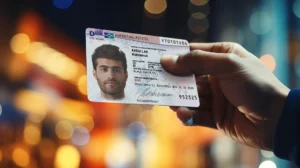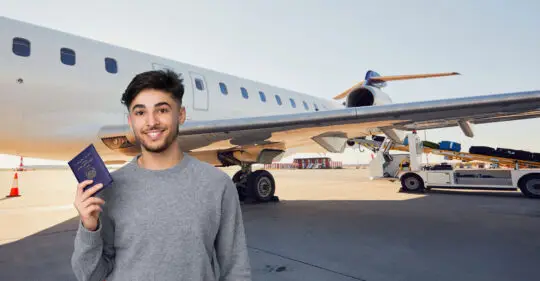What is § 16d AufenthG?
Section 16d of the Residence Act is a crucial part of the German Residence Act that enables foreign skilled workers to have their professional qualifications recognized in Germany. This paragraph creates the legal basis for issuing a residence permit specifically for this purpose.
Definition and overview
Section 16d of the Residence Act enables non-EU citizens to obtain a residence permit in Germany in order to have their professional qualifications acquired abroad recognized.
This paragraph is specifically designed to enable skilled workers to carry out the necessary qualification measures or examinations required to establish the equivalence of their professional qualifications with those in Germany.
These may be adaptation or compensation measures or further qualifications that are necessary for the recognition or granting of a professional license.
Legal basis and changes
Section 16d of the Residence Act was revised and made more immigration-friendly with the new version of the Skilled Immigration Act, which came into force on March 1, 2024. Previously, such recognition procedures often had to be started in the home country, but it is now possible to carry out these processes after entering Germany.
The residence permit according to § 16d is issued under certain conditions, including demonstrable German language skills and a suitable qualification measure. It can be issued for up to 24 months and extended by up to twelve months, whereby the total maximum duration generally does not exceed three years.

Target group and requirements of § 16d AufenthG
Skilled workers and foreigners with professional qualifications benefit from § 16d AufenthG. Prerequisites include good German language skills.
Who benefits from the 16d visa?
The target group of Section 16d AufenthG comprises the following persons:
- Highly qualified specialists from abroad
- Persons with foreign professional qualifications who wish to work in Germany
- Graduates of foreign universities who wish to have their qualifications recognized in Germany
Requirements for applying for 16d AufenthG
In order to apply for a residence permit in accordance with § 16d AufenthG, certain requirements must be met. These include, among others:
- Possession of a foreign professional qualification that is recognized by the state
- Concrete job offer in Germany
- Suitability of the qualification measure for recognition of the professional qualification or for enabling access to the profession.
- Sufficient German language skills according to the requirements of the planned employment (A2 certificate).

Employment opportunities under § 16d AufenthG
Before we go into the specific work opportunities and conditions that Section 16d AufenthG offers for the professional qualification of non-EU foreigners, it is important that you understand the basics of these regulations. These enable you as a qualified specialist to have your qualifications acquired abroad recognized in Germany and at the same time be gainfully employed.
Work opportunities during the qualification
Under Section 16d of the Residence Act, you may be employed for the recognition of your professional qualifications, but under certain conditions.
During the implementation of qualification measures, the work permit is regulated as follows:
- Part-time work: You may work up to 20 hours per week in a job that is independent of the qualification measure.
- Full-time employment: Provided that the employment is directly related to the professional skills to be acquired, work for an unlimited period of time is permitted, provided that the Federal Employment Agency has given its approval.
Conditions for employment
You must meet certain conditions in order to obtain a work permit under Section 16d AufenthG:
- The Federal Employment Agency has given its consent to the training measure in accordance with § 39: Is required, unless there is a provision in the Employment Ordinance or an intergovernmental agreement that does not require consent. In this case, Section 18 (2) no. 3 AufenthG applies.
- Job offer: You must submit a concrete job offer that is related to the qualifications to be recognized.
- Working conditions: Your employer must ensure that the working conditions correspond to those of comparable domestic employment, including the working conditions laid down in collective agreements or by church law.
These regulations are intended to ensure that the employment is conducive to the qualification measure and facilitates integration into the German labor market.
Settlement permit as a specialist?
Support through § 16d AufenthG for integration into the labor market
With the recent revision of the Residence Act, Germany is emphasizing its ongoing commitment to supporting the professional integration of international skilled workers. Support through targeted measures and effective coordination with the Federal Employment Agency play a key role in this.
Promotion of professional integration
- Legal basis: The Skilled Immigration Act, in force since March 1, 2024, facilitates the procedure for the recognition of foreign professional qualifications.
- Immigration-friendly approach: Germany is pursuing a more open policy on the integration of international skilled workers.
- Direct measures after entry: Section 16d AufenthG allows skilled workers to start necessary qualification measures immediately after their arrival in Germany.
- Objective of integration: The amendment to the law promotes the seamless professional integration and development of skilled workers in the German labor market.
Role of the Federal Employment Agency
- Approval of qualification measures: The Federal Employment Agency examines and approves the suitability of qualification measures that are necessary for the recognition of foreign professional qualifications.
- Ensuring the conditions of employment: The agency monitors compliance with legal framework conditions during the qualification phase.
- Job search support: It helps skilled workers to find suitable employment opportunities that match their qualifications.
- Efficient market integration: The Federal Agency plays a key role in the rapid and fair integration of international skilled workers into the labor market.
Common mistakes with § 16d AufenthG
When applying Section 16d AufenthG for the purpose of recognition, errors and misunderstandings often occur, which can lead to delays and complications in the recognition process.
Typical mistakes and misunderstandings
Here is an overview of the most common problems and how to avoid them:
-
Incomplete documentation: Many applicants do not submit all the required documents, which leads to considerable delays in the recognition procedure.
Solution: Make sure that all documents, such as diplomas, certificates and proof of professional experience, are fully and correctly translated and notarized.
-
Misunderstanding the language requirements: A common misconception is that minimal language skills are sufficient for a residence permit to be issued. The requirement is sufficient language skills at A2 level.
Solution: Acquire at least sufficient German language skills as required for the specific job requirements in order to avoid misunderstandings.
-
Misinterpretation of qualification measures: It is often assumed that any type of qualification or further training falls under Section 16d.
Solution: Check whether your training measures are specifically geared towards the recognition of professional qualifications and have been approved by the Federal Employment Agency.
-
Insufficient coordination with employers: Some applicants do not secure the necessary support and commitment from their employers for the recognition process.
Solution: Have clear discussions with your potential employer in advance about the requirements and obligations arising from the recognition procedure.
-
Delays in submitting applications: Delays are often caused by a lack of clarity about the right time and the steps required to submit the application.
Solution: Inform yourself thoroughly about the deadlines and required steps at the responsible office in order to submit all necessary documents in time.
Conclusion
Summary and outlook
Section 16d of the Residence Act marks a decisive turning point for the recognition of foreign professional qualifications in Germany. The introduction of this paragraph not only simplifies the procedure for international skilled workers, but also actively promotes their integration into the German labor market. The most important points are summarized here:
- Simplified recognition procedure: With the amendments to the Skilled Immigration Act, which have been in force since March 1, 2024, skilled workers can begin the recognition procedure immediately after entering Germany.
- Important roles of the Federal Employment Agency: The Federal Employment Agency is centrally responsible for the approval of qualification measures and ensures that these measures facilitate access to the profession or the recognition of professional qualifications.
- Employment opportunities during the qualification: The paragraph allows skilled workers to work up to 20 hours a week, or even full-time employment if this is directly related to the professional qualifications.
Outlook
The future development of Section 16d AufenthG and its application will be decisive in further strengthening Germany as an attractive location for qualified international workers. It is to be expected that further optimizations and adjustments will follow in order to make the integration and recognition of international skilled workers even more efficient. In the long term, this could lead to an even greater opening of the German labor market and strengthen the economy through the integration of highly qualified skilled workers from abroad.
It remains to be seen how these legal framework conditions will develop and how they will shape the landscape of skilled worker integration in Germany in the long term.
FAQ - Frequently asked questions about § 16d AufenthG
The 16d visa is a residence permit in accordance with Section 16d of the Residence Act (AufenthG) that enables non-EU citizens to have their professional qualifications acquired abroad recognized in Germany. It is specifically intended for the implementation of qualification measures or examinations that are required for the recognition of these qualifications.
The requirements for a visa according to § 16d AufenthG include:
- A state-recognized foreign professional qualification.
- Sufficient German language skills, usually at least at A2 level.
- A concrete job offer in Germany or a measure that is required for the recognition of the qualification.
- Approval of the Federal Employment Agency, if required.
You will need the following documents for the 16d visa:
- Valid passport.
- Proof of professional qualification (e.g. diplomas, certificates).
- Proof of German language skills (e.g. certificates).
- Employment contract or binding job offer that is related to the professional qualification.
- Proof of the planned qualification measure (if applicable).
Holders of a 16d visa may:
- Work up to 20 hours per week in a job that is independent of the qualification measure.
- work full-time if the job is directly related to the qualification you are aiming for and the Federal Employment Agency has given its approval.
Family reunification is difficult, but possible in individual cases if the main applicant has a residence permit under Section 16d. The main problem is that the extension of § 16d is complicated and difficult. Family members can obtain their own residence permit for the purpose of family reunification, provided that suitable accommodation and financial means to support the family are available. Whether family reunification is ultimately granted depends on the individual case.
In order to have foreign professional qualifications recognized under § 16d, you must:
- Submit an application to the responsible recognition office.
- Submit all required documents, such as diplomas and professional certificates.
- Carry out any necessary adaptation or compensatory measures.
- Pass the recognition test, which establishes the equivalence of your qualification with German standards.







